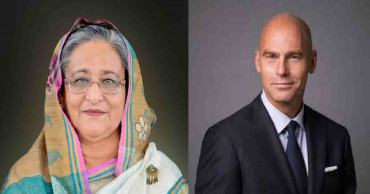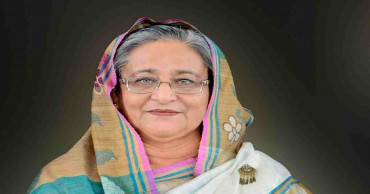Climate Vulnerable Forum
Major economies must make fair share to avert impending climate crisis: PM Hasina at UN
Prime Minister Sheikh Hasina on Wednesday alleged that Climate Vulnerable Forum's repeated calls for an equal distribution of climate finance between adaptation and mitigation have received little response.
“The Adaptation Fund needs to live up to expectations,” she said while speaking at a High-Level Thematic Session of Climate Ambition Summit “Delivering Climate Justice: Accelerating Ambition and Implementation on Adaptation and Early Warnings for All” at the UN Headquarters.
Hasina said that as a climate justice advocate, Bangladesh stands ready to align with any constructive move that advances the agenda.
“We also expect the world’s major economies to remain honest about climate change and do their fair share to avert the impending crisis,” she said.
World must learn from past mistakes to prevent another pandemic like Covid-19: PM Hasina tells high-level UN meet
She mentioned that Bangladesh is generally considered a global leader in climate adaptation.
“We have a number of nature-based, structural, and technical solutions in place that can be replicated in other parts of the world,” she said.
She mentioned that the government has released its National Adaptation Plan with a projected need for 230 billion US dollars by 2050.
PM Hasina attends banquet hosted by President Biden
“We would like to see the Adaptation Pipeline Accelerator come up with a viable model for financing and technological support,” she said.
She mentioned that Bangladesh has made considerable investments in early warning systems.
She said that the government has reduced fatalities to a single digit compared to the millions that perished during the Bhola Cyclone in 1970.
“We have one of the world’s largest community volunteer programmes comprising 65,000 coastal people. Our latest National Plan for Disaster Management has adopted an integrated multi-hazard early warning approach,” she said.
She informed that Bangladesh is using mobile technology to provide regular updates on weather forecasts.
“Bangladesh has requested the UN system to conduct a table-top exercise on nation-wide earthquake modelling,” she said.
PM Hasina honoured for her UN-recognised community clinic model in Bangladesh
She mentioned that Bangladesh’s experience demonstrates that investing in adaptation and early warning makes perfect sense.
“We hope our development partners will seize these opportunities to deliver climate justice,” she added.
The prime minister said that Bangladesh is working on its second satellite, Bangabadhu II, as an Earth Observatory.
“Bangladesh is willing to share its expertise with other vulnerable countries through South-South and triangular cooperation. I hope Early Warnings for All will be able to encourage MDBs and IFIs to join such efforts,” she said.
2 years ago
COP27: Bangladesh among first recipients of Global Shield financial support
The Vulnerable Twenty (V20) Group of Finance Ministers of the Climate Vulnerable Forum (CVF) that includes 58 climate vulnerable economies, and the Group of Seven (G7) on Monday (November 14, 2022) officially launched the Global Shield against Climate Risks – an initiative for pre-arranged financial support designed to be quickly deployed in times of climate disasters.
The first recipients of Global Shield packages – called ‘Pathfinder Countries’ – include Bangladesh, Costa Rica, Fiji, Ghana, Pakistan, the Philippines and Senegal, according to a message UNB received from COP27 being held in Egypt’s Sharm El-Sheikh.
The Global Shield will start its implementation immediately after COP27.
Initial contributions include around EUR 170 million from Germany and more than EUR 40 million from other countries.
Also read: Climate Change: IOM DDG calls for redoubling efforts ahead of COP 27
In addition, a broad coalition of countries, multilateral institutions, non-state and private sector partners has underlined their full institutional commitment to the Global Shield.
Ghana Finance Minister Ken Ofori-Atta, V20 Chair, called this is a path-breaking effort and hoped the funding window will benefit equally compared to the pre-existing structures whose performance remain to be proven.
“Our fiscal space is under constant threat and the inflationary pressures of climate change are closing out our options. As part of our Climate Prosperity Plan to reduce the 98 percent financial protection sinkhole, the Global Shield will play a key role in resourcing financial and social protection packages to protect our economy, our enterprises and our communities,” Ken said.
Ken said the Global Shield is long overdue. “It has never been a question of who pays for loss and damage because we are paying for it – our economies pay for it in lost growth prospects, our enterprises pay for it in business disruption, and our communities pay for it in lives and livelihoods lost.”
Also read: D-8 PTA likely to be operational this year to boost intra-trade
Svenja Schulze, Federal Development Minister of Germany, said that under the German presidency, the G7 have committed to scale-up action and support on loss and damage and to work towards a “Global Shield against Climate Risks”, responding to the V20’s call.
“Germany stands by its responsibility to support poor and vulnerable people and countries in dealing with loss and damage. This launch sends a signal: We have heard the urgency and we are acting. We aim at overcoming differences even in challenging circumstances. Germany wants to be a bridge-builder.”
Henry Kokofu, Special Envoy of the Climate Vulnerable Forum (CVF) Ghana Presidency, said: “This is definitely the start we need, but the more effective we are in innovations like the Shield, the more we have to emphasize that scale matters.”
Recent V20 research found that 98% of the nearly 1.5 billion people in V20 countries do not have financial protection – a massive sinkhole for these countries whose workforce is mainly employed by small and medium enterprises.
Read More: COP27: Bangladesh urges developed countries to double climate financing by 2025
According to this research, V20 countries have lost a total of USD 525 billion to climate impacts since 2000.
As risks of losses and damages from climate change escalate further, the cost of capital and debt have risen to unsustainable levels, especially across climate vulnerable economies.
The Global Shield addresses current weaknesses in the financial protection structure in climate vulnerable economies via pre-arranged finance which disburses quickly and reliably before or just after disasters happen.
It expands instruments of financial protection for governments, communities, businesses, and households, thus, lessening the impact of disasters, making vulnerable economies resilient, safeguarding sustainable development, and protecting lives and livelihoods.
Read More: Bangladesh wins COP27 award for community-led initiative
Germany is providing some EUR 170 million as seed contribution, of which EUR 84 million are core funding to the Global Shield and EUR 85.5 million for related climate risk finance instruments.
Further pledges of core funding to the Global Shield include DKK 35 million (about EUR 4.7 million) from Denmark, EUR 10 million from Ireland, USD 7 million from Canada, and EUR 20 million from France. Further contributions by donors are expected to materialize soon.
The V20 and G7 have decided that it will be steered by the Global Shield High-Level Consultative Group, which includes representatives of the V20, G7, G20, think tanks, civil society, multilateral organizations and the private sector.
A financing structure with three complementary funds forms the foundation of the Global Shield against Climate Risks: the Global Shield Solutions Platform, which builds on InsuResilience Solutions Fund, the Global Shield Financing Facility at the World Bank, and the Climate Vulnerable Forum (CVF) & V20 Joint Multi-Donor Fund.
Read More: What can COP27 do for climate vulnerable countries?
3 years ago
Hasina, Patrick seek greater funding for CVF countries for climate prosperity
Greater ambition from the world is needed to fend off the climate crisis and greater funding for CVF countries will enable them to move from climate vulnerability to climate prosperity, read a new article published by global news magazine Newsweek.
"That will be good for the 48 countries in greatest peril right now, but also for all those facing increasing threats. It is quite simply the right thing to do," Prime Minister Sheikh Hasina, also chair of the Climate Vulnerable Forum, wrote jointly with CEO of the Global Center on Adaptation Patrick Verkooijen.
In their joint opinion piece titled "More Funding is Critical for the Most Vulnerable to Survive Climate Change" they mentioned that though climate emergency is global, yet it does not affect everyone equally.
"For the Climate Vulnerable Forum (CVF)—a group of 48 countries spanning four continents—climate change is quite simply an existential threat. This is not hyperbole," according to the article published in Newsweek, a global news magazine.
Small island states such as Vanuatu, the Maldives and the Marshall Islands are being engulfed by rising sea levels.
The vast and low-lying Delta region of Bangladesh, food basket for more than 160 million people, is being poisoned by saltwater infiltration and may soon become infertile wasteland, the article said.
Extreme temperatures and severe droughts threaten to make large swathes of the Middle East, which is warming at twice the global average, uninhabitable.
For the countries that make up the Climate Vulnerable Forum (CVF), action on climate change, already urgent, simply cannot be delayed any longer.
According to the International Monetary Fund (IMF), between $6 trillion and $10 trillion needs to be invested over the next decade to green our economies, read the article.
Read:PM Hasina off to Europe to join COP26, other events
Yet most CVF members are least developed, low or at best middle-income developing nations.
They need support through both funding and expertise to help devise adaptation strategies to counter the effects of climate change, which scientists warn are already locked in for centuries.
CVF Call
At the United Nations Climate Change Conference (COP26) in Glasgow, the CVF will ask greater ambition to keep the 1.5 degrees Celsius limit on warming, a matter of survival for many of the most vulnerable nations.
"We are also spotlighting the need to be more ambitious on adaptation because we are already living inside the eye of the storm that is the global climate emergency," the article read.
And because of that, vulnerable nations are asking major emitting countries to join annual platforms at every U.N. climate conference to constantly raise ambition.
But for the poorer nations, funding is essential to realize ambitious goals.
"That is why developing nations have been so concerned that the climate finance promises at the U.N. of $100 billion in annual funding to developing countries is not being met," Hasina and her co-writer mentioned.
They are calling for the two pillars of annual ambition raising and a delivery plan on the $100 billion a "Climate Emergency Pact," which we hope to see in the outcome of COP26.
First, they will ask that rich countries finally make good on their pledge before the landmark 2015 Paris agreement to provide $100 billion a year to fund carbon emissions reduction and climate-adaptation projects in the developing world.
Because climate-vulnerable countries are already living with the devastating effects of our warming planet, at least half of this funding—$50 billion a year—must be earmarked for adaptation.
"We can then work on ways to transform these billions into the trillions needed to allow countries to move from climate vulnerability to climate prosperity," the article reads.
"We know this is possible because investing in climate adaptation delivers great value for money," according to the article.
According to figures from the Global Center on Adaptation (GCA), investing $1.8 trillion in five key areas of early-warning systems, climate-resilient infrastructure, improved dry land agriculture, mangrove protection and increasing water resilience by 2030 could reap $7.1 trillion in benefits.
And studies show that the benefits of adaptation almost always return more than double what they cost, and often more than five times as much.
"Second, and with these returns in mind, we will ask that the private sector steps up with discounted and targeted funding."
Pension funds, with their $35 trillion in assets under management, and other banks and institutions that are custodians of the savings of millions of people, must look to direct their investments toward climate-change resilience.
"As part of this, we will encourage financial institutions to offer innovative instruments such as resilience bonds, lending made for specific resilience projects at below market rates, or debt-for-climate swaps where repayments are redirected from creditors toward domestic climate-change projects. Look to the Seychelles, for example, which has swapped some of its national debt (held by the Nature Conservancy) in return for creating the Seychelles Conservation and Climate Adaptation Trust," the article reads.
Third, also at COP26, vulnerable nations are asking that the agreed revenues from carbon exchange schemes under the Paris agreement are channeled at the level of at least a 5 per cent levy on transactions to countries suffering the worst consequences of climate change.
They are often the ones who have done least to cause it.
The monies raised from carbon abatement schemes could be substantial—and so make a substantial difference.
Read: PM’s France visit to elevate Dhaka-Paris ties: FM
Research suggests that the IMF recommended benchmark of a global $75-per-ton carbon tax is equivalent to $0.17 a litre extra at fuel pumps, which would generate $40 billion additional tax revenues annually across Africa alone.
Finally, they will ask that pandemic recovery resources be used with climate adaptation in mind, including some of the $650 billion of newly allocated IMF Special Drawing Rights (SDRs).
These unprecedented resources should be channeled toward resilient infrastructure—roads and bridges that can withstand flooding, for example—and increased food and water security. Options are already being explored to channel SDRs from wealthier to poorer and more vulnerable member countries to climate-proof their economic recovery.
A new Resilience and Sustainability Trust being considered for this purpose would be a very good start.
Bangladesh, for example, is already sharing best practices and adaptation knowledge with other climate-vulnerable countries through the GCA's regional office in Dhaka, the article read.
This includes its experience of adopting the Mujib Climate Prosperity Plan, which aims to ensure funds are used to promote green growth as well as that the country's investment focus is on resilient infrastructure and renewable energy as well as the Climate Change Trust Fund which undertakes mitigation and adaptation programs to offset climate-induced impacts.
Bangladesh spends, on average, 2.5 per cent of its GDP or $5 billion each year on climate adaptation and resilience-building.
Nearly 800 adaptation and resilience projects have been implemented across the country, including 12,000 cyclone shelters and 200,000 hectares of coastal green belts at a cost of $450 million.
"To make the most of this co-operation, we also need more adaptation initiatives," reads the article.
The newly created Agriculture Innovation Mission for Climate (AIM4C), for example, was founded to help equip farmers on the frontline of climate change with new climate-smart solutions and tools.
With its three objectives of increasing investment in agriculture innovation, enabling co-ordination and collaboration and increasing co-operation, AIM4C is in a position not only to enhance existing efforts but also encourage their expansion.
The response by governments around the world to the COVID-19 pandemic has shown what is possible when we face imminent peril.
"We must harness this same drive in our response to existential climate threats," read the article.
4 years ago
CVF happy getting UN Special Rapporteur on HR
The Climate Vulnerable Forum (CVF), led by Bangladesh, has appreciated the creation of a position of UN Special Rapporteur to play a dedicated role in protecting and promoting human rights in the context of climate crisis.
The position was created at the Human Rights Council (HRC) in Geneva through a resolution at the 48th Session of the UN’s supreme body for human rights.
Speaking for the Climate Vulnerable Forum Presidency, Foreign Minister Dr AK Abdul Momen welcomed the adoption of resolution on the mandate of the new HRC special rapporteur on the promotion and protection of human rights in the context of climate change.
He said this was a proud achievement for the people of the world’s most climate threatened nations, where many of them are being deprived of their rights to life and decent living due to climate change-related displacement.
From the outset of Bangladesh’s presidency, pursing this mandate had been a top priority, said the Foreign Minister.
Read: Hasina’s climate leadership lauded at CVF-COP26 dialogue
In the CVF nations, 1.2 billion people are facing threats to the enjoyment of their fundamental human rights through climatic consequences, including sea-level rise, river erosion, salinity increase, floods and draughts that claim lives, livelihoods and displace people from their ancestral homes and traditional jobs.
Dr Momen extended thanks to the Members of the Human Rights Council for supporting the long overdue and critical resolution to create this mandate.
He also expressed his sincere thanks to the CVF Secretariat for their efficient support and useful advice to the CVF Presidency and all Member States of the CVF.
CVF’s Thematic Ambassador for Vulnerability, Saima Wazed; the Speaker of the Maldives People’s Majlis, and former President of Maldives Mohamed Nasheed who is now the CVF Thematic Ambassador for Ambition; and Tosi Mpanu Mpanu, Chair of the UNFCCC Subsidiary Body for Scientific and Technological Advice (SBSTA) and CVF Thematic Ambassador for Renewable Energy also welcomed the decision taken by the UN Human Rights Council to establish the post of the Special Rapporteur on Human Rights and climate change.
Read: Help achieve green recovery of CVF-V20 countries: Hasina to developed nations
The new mandate responds to repeated calls, first initiated by the CVF in 2019, and from wide-ranging climate-vulnerable countries, small island developing countries, least developed countries, low-lying countries, and landlocked countries at the forefront of the climate-change crisis.
A joint statement led by Bangladesh at the 46th HRC session in March 2021 calling for the creation of the special rapporteur was supported by 54 states.
The resolution adopted on 8 October 2021 emphasises the need for a continued focus on addressing the adverse consequences of climate change for all, particularly in developing countries and for the people whose situation is most vulnerable to climate change.
4 years ago
Hasina places six proposals to make world more liveable
Prime Minister Sheikh Hasina on Friday put forward six proposals to make the world more liveable by bringing down carbon emissions and tackle the people being displaced across the globe due to climate change.
She placed her proposals while delivering the pre-recorded speech in the ‘Major Economies Forum on Energy and Climate’, convened by US President Joe Biden.
The Prime Minister, in her first proposal, asked the major carbon-emitting countries to take action to reduce their emissions to keep the global temperature rise at 1.5 degrees Celsius.
In her second proposal, Hasina renewed her call for fulfilling the commitment of an annual 100-billion-dollar climate fund by the developed countries and distributing it 50:50 between adaptation and mitigation.
The Prime Minister, in her third proposal, advised the developed countries to come forward with the most effective energy solutions along with technology transfer to the developing countries.
Also read: Hasina places 4 suggestions to deal with climate challenge
4 years ago
Help achieve green recovery of CVF-V20 countries: Hasina to developed nations
Prime Minister Sheikh Hasina on Thursday placed a five-point proposal, including the green recovery of climate vulnerable countries with support from the developed nations, as the climate change has brought them to a threshold.
“Developed nations should facilitate the green recovery of the CVF-V20 countries. Dedicated support is required for reducing the cost of capital and encouraging private sector participation,” she said while placing her proposals in the first V20 Climate Vulnerable Finance Summit.
Sheikh Hasina, also the President of Climate Vulnerable Forum (CVF), opened the Summit organised by Finance Ministers of the Vulnerable Twenty (V-20), joining it virtually from her official residence Ganobhaban.
“Every country must pursue an ambitious target to curb Greenhouse gas emissions to keep the global temperature-rise below 1.5ºC,” she said.
“Fund flow must be predictable, balanced, innovative and incremental. Development partners and international financial institutions should adopt a user-friendly process of fund allocation and disbursement. There must be synergies among various climate funds,” she said in the third proposal.
“Rich nations must help CVF-V20 countries by closing the existing financial gaps in protecting climate-induced disasters. Financial support is needed to introduce smart insurance premium subsidies and capitalization of insurance products for CVF countries,” said Hasina, placing the fourth proposal.
“Finally, every vulnerable country may actively consider adopting a 'climate prosperity plan' like our 'Mujib Climate Prosperity Plan.' I request the international community to provide all-out support to realize our plans,” she said, putting forward the fifth proposal.
The Prime Minister said Earth is in a dire state. “We must be sensible in our actions. Let’s work together to build a strong climate resilience world.”
Also read: Hasina suggests 6 points for framing post-Covid global recovery plan
She urged the finance ministers, development partners, international financial institutions, and multilateral development banks to find innovative financing solutions for climate prosperity.
Hasina said the disastrous impacts of climate change mainly caused by GreenHouse Gas emissions are loudly visible around the world. “We must reverse these for our survival and survival of our future generations,” she added.
4 years ago
PM to open V20 Finance Summit Thursday
Prime Minister Sheikh Hasina, currently the Chair of the Climate Vulnerable Forum (CVF), will open the V20 Climate Vulnerables Finance Summit virtually on Thursday.
Heads of state and government, G20 and major International Financial Institutions, including Secretary General of the United Nations Antonio Guterres will join the summit scheduled to be held from 7.30-9.50pm.
Read: Climate change project in Bangladesh gets 2-year extension
Finance Minister AHM Mustafa Kamal, Chair of the V20, made the announcement at a virtual briefing on Wednesday saying the Summit is poised to become one of the most crucial and eminent platforms for decisive climate action in the lead up to COP26 Glasgow.
Formed in 2015, the V20 Group of Finance Ministers is a dedicated cooperation initiative of economies systematically vulnerable to climate change.
At present, the Vulnerable 20 (V20) membership extends to 48 countries.
The V20 represents the economies of a collective 1.2 billion people with some of the consistently highest growth rates in the world yet facing existential threats from growing perils of climate change.
Collectively, V20 countries seek a transformational approach to global economic activities anchored in keeping global warming to below 1.5 degree Celsius while simultaneously maintaining the growth trajectory of the world economy.
The summit will feature heads of state/government from Climate Vulnerable Forum member countries including Colombia, Costa Rica, Ethiopia, and the Marshall Islands; V20 finance ministers from countries including Afghanistan, Bangladesh, Bhutan, Burkina Faso, Costa Rica, Dominican Republic, Ghana, Haiti, Ethiopia, Fiji, Grenada, Honduras, the Maldives, Marshall Islands, the Philippines, Timor-Leste, and Sri Lanka; along with Minister of Foreign Affairs and Minister of Environment, Forestry and Climate Change of Bangladesh.
In close cooperation with the United Nations, international financial institutions and key development partners, the dialogue will shape globally cooperative responses on a global magnitude in order to ensure fast-tracked efforts in building resilience.
Partners represented by at least 25 Finance Ministers, UN Secretary General, heads of state/government from Ethiopia, Costa Rica, Colombia and the Marshall Islands, United States Special Presidential Envoy for Climate, World Bank (WB) President, Asian Development Bank (ADB) President, Asian Infrastructure Investment Bank (AIIB) President, European Investment Bank (EIB) President, Global Environment Facility (GEF) CEO, Green Climate Fund (GCF) Executive Director, International Renewable Energy Agency Executive Director, United Nation University’s Institute for Environment and Human Security, United Nations Environment Program (UNEP), Insurance Development Forum, and other stakeholders will constitute the parties in attendance at the summit.
4 years ago
Bangladesh to host V20 Climate Vulnerables Finance Summit on July 8
Bangladesh will host the first- ever virtual V20 Climate Vulnerables Finance Summit on July 8.
The Summit will feature Prime Minister Sheikh Hasina, heads of state from Climate Vulnerable Forum member countries and V20 Finance Ministers to mobilize more robust economic and finance responses to the spiraling dual crisis that increasingly affects the world’s most vulnerable economies.
The government of Bangladesh is currently chair of the Climate Vulnerable Forum and the V20 Group of Finance Ministers.
Read:Climate change project in Bangladesh gets 2-year extension
Prime Minister Sheikh Hasina will deliver keynote speech while Finance Minister AHM Mustafa Kamal will chair the event to be moderated by Maldives Speaker Mohamed Nasheed.
Prime Minister Fiame Naomi Mataʻafa, Independent State of Samoa, President Iván Duque Márquez, Republic of Colombia and President Sahle-Work Zewde, Federal Democratic Republic of Ethiopia will also join.
Rishi Sunak, Chancellor of the Exchequer, United Kingdom, John Kerry, US Special Presidential Envoy for Climate António Guterres, Secretary-General, United Nations, David Malpass, President, The World Bank, Kristalina Georgieva, Managing Director, International Monetary Fund and Ban Kim Moon, Board Chair, Global Center on Adaptation will speak.
Read: Bangladesh to host V20 Climate Vulnerables Finance Summit in July
DELEGATES FROM V20 COUNTRIES
Mohammad Khalid Payenda, Minister of Finance, Afghanistan, Lyonpo Namgay Tshering, Minister of Finance, Bhutan, Elián Villegas Valverde, Minister of Finance, Costa Rica, Alfred Alfred Jr, Minister of Finance, Republic of Marshall Islands, Rui Augusto Gomes Minister of Finance, Timor-Leste, Hồ Đức Phớc, Minister of Finance, Viet Nam, Paola Alvarez, Assistant Secretary, Department of Finance, Philippines, Liliam Rivera, Undersecretary of Credit and Public Investment, Ministry of Finance, Honduras, Nam-ki Hong, Deputy Prime Minister and Minister of Economy and Finance, South Korea, Dr. Maria Flachsbarth Parliamentary State Secretary to the Federal Minister for Economic Cooperation and Development, Germany.
Read Global hunger levels rise as conflict, climate shocks and Covid collide
Partners
Francesco La Camera, Director-General, International Renewable Energy Agency (IRENA), Hong-Thuy Paterson, CFO, Green Climate Fund (GCF) and Toshinori Doi, Director, ASEAN+3 Macroeconomic Research Office (AMRO).
Formed in 2015, the V20 Group of Finance Ministers is a dedicated cooperation initiative of economies systematically vulnerable to climate change. It is currently chaired by the People’s Republic of Bangladesh.
Read: Climate Change to get priority in Bangladesh alongside Covid support:ADB
The V20 membership stands at 48 economies including Afghanistan, Bangladesh, Barbados, Bhutan, Burkina Faso, Cambodia, Colombia, Comoros, Costa Rica, Democratic Republic of the Congo, Dominican Republic, Ethiopia, Fiji, The Gambia, Ghana, Grenada, Guatemala, Haiti, Honduras, Kenya, Kiribati, Lebanon, Madagascar, Malawi, Maldives, Marshall Islands, Mongolia, Morocco, Nepal,
Niger, Palau, Palestine, Papua New Guinea, Philippines, Rwanda, Saint Lucia, Samoa, Senegal, South Sudan, Sri Lanka, Sudan, Tanzania, Timor-Leste, Tunisia, Tuvalu, Vanuatu, Viet Nam and Yemen.
Read Prof. Ainun Nishat joins Bangladeshi teenager’s climate campaign
4 years ago
Renewable energy: 40% target ‘ambitious, but roadmap absent’
Bangladesh has set a goal of generating 40 per cent of electricity from renewable sources in the next 20 years, but a roadmap on how to reach that lofty target is absent.
The government has adopted a mega plan on power: to boost electricity production to 60,000 MW by 2041 with renewable energy’s share rising to 24,000 MW, which now stands at 700 MW.
Energy experts and stakeholders in the green energy sector believe a comprehensive and inclusive roadmap is necessary to reach the target of 24,000 MW of electricity from renewable sources in the next 20 years.
Read Bangladesh’s single largest rooftop solar power plant inaugurated in Korean EPZ
State Minister for Power, Energy and Mineral Resources Nasrul Hamid unveiled the government’s latest vision on renewable energy during a Bangladesh-UK Climate Partnership Roundtable on June 2 in the city.
President of COP26 Alok Sharma, Foreign Minister AK Abdul Momen, and Environment, Forest and Climate Change Minister Shahabuddin Uddin were present at the function.
Earlier, Bangladesh had set a plan to generate 10 per cent of electricity from renewable sources by 2020. But it could raise it nearly 3 per cent only.
Also read: Renewable energy could be Bangladesh’s best option post Covid-19
Data available from the Sustainable and Renewable Energy Development Authority (Sreda) shows the country now generates 730 MW from renewable sources, including solar, wind and hydro.
About the new target, Nasrul said he is confident of achieving the goal as the government is determined to do this as part of its commitment to the Climate Vulnerable Forum (CVF) where Bangladesh is the chair.
“We’ve already awarded a good number of contracts in public and private sectors for renewable energy plants which will cover 15 per cent while the country is trying to import hydro electricity from Nepal and Bhutan,” he said.
Read EGCB signs MoU with Marubeni to build 100 MW solar plant in Sonagazi
“A deal is ready to be signed with Nepal for importing 700 MW hydro power from Nepal while negotiations are on with Bhutan to import hydro power from the Himalayan nation,” he claimed, adding that if such moves become successful it would hugely boost the country’s renewable energy generation.
Nasrul thinks the technologies on green energy are changing so fast that no long-term plan should be followed.
“Instead, the country should work out a short-term plan for two or five years as a dynamic one to adopt new technologies,” he told UNB.
Read Solar power plant in Manikganj starts commercial operation
Nasrul said the new target will be aligned with the next Power System Master Plan (PSMP).
4 years ago
Dhaka, London hopeful of signing climate accord before COP26
Bangladesh and the United Kingdom are planning to sign a "climate accord" before COP26 and expressed optimism for a successful outcome of the COP26 with a possible CVF-COP26 event at Glasgow.
The two countries agreed to work together to put nature at the heart of their climate action, building on the 2020 Leaders’ Pledge for Nature and realising shared commitments towards conservation of biodiversity and ecosystems, as well as those under the Global Ocean Alliance and the Commonwealth Blue Charter.
As founding members of the Adaptation Action Coalition, Bangladesh and the UK renewed their commitment to work together with other Coalition members to accelerate adaptation on the ground with a particular emphasis on promoting locally led climate action, according to a joint statement issued on Thursday.
The two countries will do more to avert, minimise, and address Loss and Damage, said the joint statement on climate action between the two countries.
Bangladesh and the UK will work together to get the network operating, following the UK-led Climate and Development Ministerial and drawing on the expertise in the UK, Bangladesh and internationally.
Foreign Minister Dr AK Abdul Momen and COP26 President-Designate Alok Sharma met on Wednesday during the visit of COP26 President-designate to Bangladesh on June 2-4.
Also read: COP26: Alok Sharma pledges support for Bangladesh towards clean energy transition
They jointly reaffirmed their commitment to enhancing cooperation between Bangladesh and the United Kingdom in tackling climate change’s causes and adverse effects. They agreed to demonstrate sustained leadership to tackle the climate emergency bilaterally and globally.
The two countries agreed to exchange expertise, share technology, facilitate partnerships, and identify practical solutions to common climate challenges.
4 years ago





.jpg)



.jpg)







